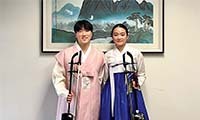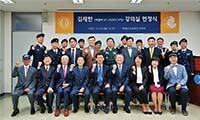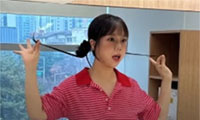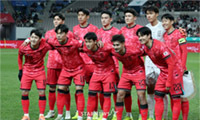-유럽에 오래 머무르시면서 수행과 참선지도를 하고 계시는데 유럽에 서 불교, 나아가 참선에 대한 관심은 어떤지요.
▲유럽 사람들은 선(禅)불교를 매우 존중합니다. 그들은 선의 가르침의 힘을 진정으로 믿습니다. 사실 그들은 선이 종교라고 생각하지 않습니 다-그들은 선을 기성종교보다 "더 나은” 것으로 생각합니다. 그래서 요즘은, 한 예로, 중세기의 아주 유명하고 오래된 대학인 레겐스부르 그 대학에서 가르치는 그룹이 하나 있는데, 그들은 뮌헨의 가톨릭 교 구 소유의 명상룸을 사용합니다. 그곳 신부들과 스탭들은 우리가 그곳 에서 참선하는 것을 진정으로 환영하고, 심지어 우리와 함께 좌선을 하고 싶다는 신부들도 있었습니다. 이렇듯, 선(禅)은 독일과 유럽 전반 에서 극진히 존중받고 있습니다. 지식인부터 일반인, 일상 노동자와 주부들까지, 유럽인들은 선(禅)과 불교에 대해 아주 좋은 이미지를 갖 고 있습니다.
(In Europe, people respect Zen Buddhism very much. They really believe in the power of Zen teachings. In fact, they do not really believe that Zen is a religion -- they think of it as being "better" than organized religion. So, for example, in these days, one of the groups that I am teaching, at a famous and ancient university from the Middle Ages, University of Regensburg, the group uses a meditation room which is owned by the Catholic Archdiocese of Munich. The priests and the Catholic staff really welcomes us to practice meditation in their church, and the priests even said that they want to come and sit Zen meditation with us. So, Zen is very very highly-respected in Germany, and in Europe in general. From high intellectuals to regular, everyday workers and housewives, in Europe people have a very good image of Zen and Buddhism.)
-조계종단에서 <한국불교 세계화>를 표방하며 이런저런 행사들을 하고 있습니다. 뉴욕에서 열린 사찰음식 박람회도 그 일환이었습니다. 우선 <한국불교>라는 용어가 타당한지 의문입니다. 또한 사찰음식 박람회 같은 먹거리 행사가 불교 내지 한국불교 세계화와 무슨 합리적 연관성 이 있는지 의문입니다. 스님의 말씀을 듣고 싶습니다.
▲오늘날 한국불교는 세계 도처로 가르침을 포교하기 위해 힘차게 노력 하고 있습니다. 그것은 아주 훌륭합니다. 그러나 거의 모든 경우에 조 계종 지도부는 문화상품을 "수출” 또는 전파하려 애쓰고 있습니다. 그 들은 부처님의 가르침 자체보다 불교내의 한국적인 부문에 대한 관심 을 높이는 데 훨씬 더 쏠리고 있습니다. 그 이유는 조계종이 한국문화 전파를 위해 한국정부로부터 자금을 받기 때문입니다. 관광은 세계에 서 첫째 혹은 둘째로 큰 산업부문입니다. 그래서 당연히 각국 정부는 해당국가의 관광과 “브랜드 이미지”를 증진하는 문화상품 수출을 미덕 으로 삼지요. 오늘날 조계종이 간여하는 것은 대강 이렇습니다. 이런 상황은 좋지도 궂지도 않습니다. 제 은사이신 숭산 스님께서는 언젠가 “대개의 한국인들에게 한국불교란 7할이 한국이요 3할이 불교를 뜻한 다”고 말씀하신 적이 있습니다.
진정한 참선수행이란 “사찰음식” 같은 그런 걸 보여주는 것과는 아무 관련이 없습니다. 석가모니 부처님께서 언제 색다른 음식에 대해 말씀 을 하셨던가요? 그리고 만약 “사찰음식” 박람회에서 홍보하는 “사찰음 식” 메뉴를 보면, 거개는 사찰에서 비구나 비구니가 먹는 음식이 결코 아닙니다! 대개 일년에 한번쯤 어떤 대사 때 아니면, 사찰에서는 결코 구경도 할 수 없는 진수성찬 채식요리더군요.
부처님은 승려들에게 거리에서 걸식하라고 가르치셨습니다. 어떻게 그 멋진 “사찰음식”이 승려들의 실제음식이라 하겠습니까? 진정한 “사찰 음식”이란 소박한 밥 한 공기와, 소박한 국 한 종지, 그리고 존재의 의미에 대한 참구를 말합니다. 사찰생활의 진정한 영양식은 “나는 무 엇인가?”라는 질문에 천착하는 수행입니다. 이것이 진정한 “사찰음식’ 입니다. 그러니 어떻게 정부가 이런 걸 팔 수 있겠어요? 그리 탐나지 않겠죠. 하하하하!!!
그러나 오늘날 한국정부는 “한국적인” 브랜드를 구축하기 위해 가능한 모든 방식으로 한국문화를 홍보하고자 합니다. 그리고 한국의 승려들 은 그런 게 불교에 도움된다 생각하면서 정부에 매우 매우 협조적입니 다. 좋다 궂다 그런 말이 아닙니다. 하지만 조계종이 서구에 진정한 선의 가르침을 심어주기 위한 프로그램을 강구하는 것보다는 문화산업 과 국가브랜드 증진사업을 돕는 데 그토록 빨려드는 걸 보노라면 조금 슬퍼지기도 합니다.
“사찰음식” 문화-브랜드니 하는 것이 어떻게 생사문제로 고뇌하는 우 크라이나나 시리아의 젊은이들에게 도움을 주겠습니까? “사찰음식”은 단지 배만 불릴 수 있을 뿐, 진정한 영적 진리를 알고자 하는 마음의 허기를 충족시킬 수는 없습니다. 한데, 순전히 문화상품에 불과한 이 것에 너무 많은 돈이 쓰여집니다. 그게 나를 슬프게 합니다.
(Nowadays, Korean Buddhism is making strong efforts to spread its teachings throughout the world. That is very wonderful. But in nearly all cases, the leaders of the Chogye Order are making an effort to "export" or spread a CULTURAL product. They are much more interested in creating interest in the KOREAN part of Buddhism than in the teachings of the Buddha himself. The reason for this is because the Chogye Order receives money from the Korean Government in order to spread Korean culture. Tourism is the first or second largest industry in the world. So, naturally, governments see the virtue in exporting CULTURAL products which stimulate interest in tourism and "brand image" for the country. This is mostly what the Chogye Order is involved with nowadays. Such a situation is not good, not bad. As my teacher, Zen Master Seung Sahn once said, "To most people in Korea, Korean Buddhism means 70% Korea and 30% Buddhism."
True meditation practice has NOTHING to do with the issue of showing off "temple food" and such products. When did Shakyamuni Buddha ever talk about different styles of food? And if you look at the "temple food" products that they promote in these "temple food" exhibitions, it is almost NEVER the kind of food that monks and nuns actually eat in temples! It is usually extravagantly- prepared vegetarian foods which we might never, ever see in the temple, except maybe once a year during some big event.
The Buddha taught monks to beg for their food in the streets. How can this pretty "temple food" actually represent the actual food of real monks?
True "temple food" means a simple bowl of rice, a simple bowl of soup, and an intense question about the meaning of existence. The true nutrition of temple-life is the practice of looking into the question: "What am I?" This is the REAL "temple food." But how can a government sell THIS? It’s not so sexy! ha ha ha ha ha!!!
But nowadays the Korean government wants to promote its culture in any fashion possible, in order to build the "Korean" brand, and Korean monks are very, very to help the government, thinking that this helps Buddhism. This is not good, not bad. But it is a little sad for me to see the Chogye Order become so involved in helping to promote a cultural industry and national branding, rather than truly establish programs for spreading authentic Zen teachings in the West. How does "temple food" cultural-branding help a young person in Ukraine or Syria who is wondering about the question of life-and-death? "Temple food" only can make the belly full; it cannot satisfy the mind-hunger for understanding true spiritual truth. Yet so much money is spent to export this purely cultural product.... That makes me sad.)
-한국에서 수행하시면서 느끼신 한국 불교계의 긍정적 측면과 아쉬운 측면에 대해서 말씀해 주십시오. 미국 명문대 출신이란 점 때문에 도 리어 불편을 겪으셨을 줄 압니다. 그 점에 대해서도 한말씀 부탁드립 니다.
▲나는 한국불교가 일반사회에 몇몇 규범적 이슈들에 대해 보다 공적인 지침을 주는 것을 보고 싶습니다. 예컨대, 가톨릭계는 빈부격차, 빈곤 문제, 연구용 줄기세포 활용문제, 또는 죽음과 슬픔 같은 이슈들에 대 해 공적인 지침을 자주 표명합니다. 나는 한국불교의 지도승들이 이런 이슈들에 대해 보다 공적인 입장을 취한다면 좋겠다는 생각합니다. 예 를 들어, 미국에서는 점점 더 많은 이들이 동성결혼 제도화를 받아들 이고 있습니다. 동성결혼은 미국의 중심이슈 중 하나인데, 각처의 종 교지도자들이 각자의 견해를 밝힙니다. 요즘 미국에서는 마리화나 사 용의 합법화도 이슈입니다. 나는 조계종의 지도승들이 불교적 관점에 서 한국사회의 이같은 이슈들에 대해 발언하는 것을 보게 된다면 매우 자랑스러울 것입니다. 이는 그러한 이슈들에 대해 민초들이 자신들의 판단을 내리는 데 있어 큰 빛줄기가 될 것이라 생각합니다.
한국의 여승(비구니)들이 한국불교에서 아직 완전평등을 누리지 못함 을 보노라면 대개 나는 슬퍼집니다. 솔직히 말하면. 한국불교에서 여 성들은 가톨릭 수녀들이나 개신교 여성들보다는 더 자유와 평들을 누 리고 있습니다. 예컨대, 한국의 비구니들은 비구들과 “똑같이” 개인 소유의 절을 운영할 수 있고, 법문하고 의식(제사)을 집전하며 결혼식 과 장례식을 치를 수도 있습니다. 비구니들은 비구들이나 남성 지도자 들의 허락을 받을 필요없이 자유로이 여행할 수 있고 가르칠 수 있습 니다. 한국내 다른 종교들에서는 없는 일이지요. 이는 매우 간과되고 있는 사실인데, 한국불교를 사랑하는 모든 이들이 마땅히 매우 매우 자랑스럽게 여길 만한 일입니다.
하지만 한국의 비구니들은 아직 완전평등을 누리지는 못합니다. 그들 에게는 조계종 지도자를 뽑는 투표권이 없습니다. 아직 조계종은 비구 들에 의해 거의다 좌우되고 한두가지 상징적 자리만 비구니들에 주어 집니다. 조계종의 재원과 운영방향, 전반적 지침은 남성 스님들에 의 해 결정됩니다. 이건 유감스러운 상황이라고 생각합니다. 하나의 전통 이 “세계적으로” 뻗어나가고자 한다면, 세계에 보편적 남녀평등의 진 정으로 보편적 메시지를 전달하는 것이 매우 매우 중요합니다. 보편적 남녀평등은 곧 모든 불성의 보편적 평등이지요.
그리고, 마지막으로, 나는 강한 민족주의가 사라진 미래의 한국불교를 봤으면 하는 서원을 갖고 있습니다. 나를 비롯한 많은 서구출신 승려 들은 한국불교가 그 위대한 전통을 나타내는 방식에서 강렬하고 때로 는 거칠기까지 한 민족주의적 요소의 영향이 있음을 일상적으로 경험 하고 있습니다. 과거에 우리는 요즘보다 훨씬 더한 것도 겪었지만, 불 필요한 편견들은 여전히 남아 있습니다. 제 스승 숭산 대선사께서는, 당신이 한국인이라는 점에 몹시 긍지를 갖고 계시면서도, 편견이나 차 별의 말씀을 단 한마디라도 하신 적은 결단코 한번도 없습니다. 그런 데 많은 비구들과 비구니들이 그 가치를 모르고 있습니다.
(I would like to see Korean Buddhism give more public teachings to general society about some of the ethical issues of the day. For example, the Catholic Church often expresses its public teachings about issues such as the gap between rich and poor, or the issue of poverty, the issue of using stem cells for research, or teachings on death and grieving. I think that it would be good if leading Korean Buddhist monks took a more public stand about some of these issues. For example, in America, more and more Americans are accepting the establishment of gay marriage in the U.S. This is a central issue for American life, and religious leaders from every side let their views be known. In the U.S. nowadays, there is the issue of legalization of marijuana use. I would be very proud to see when leading monks of the Chogye Order would speak about these issues in Korean society, from a Buddhist point of view. I think that that would give great clarity to people as they make their CIVIC decisions based on these issues.
Mostly, I am saddened to see that Korean nuns (bikkhuni) do not yet have full equality in Korean Buddhism. To be honest, in Korean Buddhism, women have MORE freedom and equality than nuns in the Catholic Church and women in the Protestant churches. For example, Korean nuns can manage their own temples, and in those temples, they can give Dharma talks and conduct ceremonies (jae- sa) and perform marriages and perform death ceremonies just the SAME as Korean monks. They can travel and teach freely without needing to get permission from monks or male leaders, whereas, in other religions, this is not possible in Korea. This is a very overlooked fact, and something about which all people who love Korean Buddhism should be very, very proud.
But Korean nuns still do not have a full equality. They still do not have the right to vote for the leaders of the Chogye Order. The Chogye Order is still largely controlled by monks (bikkhu), and only one or two token positions are given to nuns. The resources and the direction and the entire attitude of the Chogye Order are determined by male Sunims. I find this to be a regrettable situation. Especially for a tradition that wants to go "worldwide," it is very very important to bring to the world a TRULY universal message of the universal equality of men and women, which is just the universal equality of all Buddha-nature.
And, lastly, I look forward to a future Korean Buddhism where the strong nationalism disappears from Korean Buddhism. I and so many other Western monks experience, on a daily basis, the effects of this strong, sometimes abrasive nationalistic element in the way Korean Buddhism presents its great traditions. In the past, our experiences were much more bitter than in these days, but unnecessary prejudices still remain. My Teacher, Zen Master Seung Sahn, never -- ever!! -- expressed even a single word of prejudice or discrimination, even while he himself remained intensely proud of being a Korean. But most monks and nuns do not know of this quality.)
-뉴욕과 LA 등 미국에도 몇차례 다녀가셨는데 동포사회의 불교계에 대 해서는 어떻게 보시는지 궁금합니다. 다른 커뮤니티 불교계와의 비교, 유럽계 미국인들의 불교에 대한 인식 등도 곁들여 주시면 감사하겠습 니다.
▲불교가 재미한인사회에서 어떻게 받아들여지는지 모르겠습니다, 거기 살고 있지 않으니까요. 서구생활에 통합되는 초기 50-100년동안 한인 사회 안에는 생존과 적응의 압박이 상당했겠지요. 그래서 미국의 교육 적 사회적 문화적 제도권에 아무래도 교회들이 보다 나은 커넥션을 갖 고 있는 것 같으니 교회에 다녀야 하는 것 아닌가 하는 압박도 상당했 을 겁니다. 그런데 지난 10-15년간 서구 교회들에서 학대니 부패니 때 문에 큰 불만이 생겨난 걸 보았지요. 그래서 교회로 말미암은 압박을 거부하거나 아니면 다른 영적 대안을 찾아나서게 되었지요.
그러면 자연스럽게, 만약 우리가 선(禅)불교의 진정한 본질-오직 “나는 무엇인가?”라는 질문에 관심을 두는-을 가르친다면, 그러면 자연스럽 게 사람들은 선불교가 정말 놀라운 가르침이요 기술이란 것을 알게 될 것입니다! 유럽 등 서구에서 선을 지도할 때 내가 언제나 강조하는 것 은 선이 종교도 신학도 철학도 아니라는 것입니다. 그것은 단순히 하 나의 기술, 내 본래면목을 일깨우고 찾아내어 우리가 이 세상에 도움 이 되도록 하는 기술이라는 것입니다. 이 기술을 정확하게 제시한다면 , 사람들은 즉시 그 긍정적 효험을 보게 될 것입니다. 참선수행의 긍 정적이고 건강에 이로운 효험은 수많은 과학연구에 의해 이미 입증되 었습니다. 다른 어떤 “종교”에도 그 종교의 교리나 역사에 대한 이런 과학적이고 합리적인 실험과 증명은 없습니다. 우리는 이것, 즉 선의 과학을 강조해야 합니다. 그러면 아무 문제가 없어집니다. 그렇지 않 습니까? 멋진 “사찰음식”보다 더 낫습니다. (하하하하하!)
(I do not know how Buddhism is viewed in the Korean diaspora in the US, since I do not live there. I think that, like most Koreans, for the first 50-100 years of Korean integration into life in the West, there has been an intense pressure WITHIN the Korean diaspora to survive, and therefore, to CONFORM. So, there has been intense pressure within the Korean community to join churches, since they are seen to have greater connection to American educational and social and cultural institutions. Now, for the last 10-15 years, there has been great dissatisfaction with the abuses and the corruption they see in the Western churches. So, there has been either a rejection of this church- oriented pressure, or else a search for other spiritual alternatives.
Then, naturally, if we teach the true essence of Zen Buddhism -- which is just concerned with the question of "What am I?" -- then, naturally, people will see what a marvelous teaching and technology it is! I always emphasize, when teaching Zen in Europe and the West, that Zen is not a religion or a theology or a philosophy: it is simply a technology, a technology for waking up and finding my True Nature so that we can help this world. If we present this technology correctly, people will immediately see its positive benefits. The positive, healthy benefits of meditation practice are already proven by numerous scientific studies. No other "religion" has these scientific, rational tests and proofs of the claims of their dogma or history. We should mostly emphasize this, the science of Zen, then everything will be no problem. Why not? Better than pretty "temple food." (ha ha ha ha ha!)
-이번 가주행에서 가장 역점을 두실 부분은 무엇인지요. 가주 한인불 자들에게 하시고픈 말씀도 곁들여 주십시오.
▲이번 캘리포니아 방문 중, 나는 인간의 꺠어있음의 중요성을 강조하 고 싶을 따름입니다. 지금 이 세계는 믿기 힘든 위기에 처해 있습니다 . 도처에 전쟁입니다. 낯선 괴질이 돌고 있습니다. 사악한 사람들은 가공할 무기들을 퍼뜨리려 호시탐탐 안간힘을 쓰고 있습니다. 유류연 료 가격은 하시라도 치솟을 수 있습니다. 이는 음식에서 의류까지, 그 리고 따스한 겨울나기, 여행, 하다못해 약품 하나 사는 것까지 등 우 리 삶의 모든 면에 영향을 미치게 됩니다.
빈부격차는 더없이 크게 벌어지고 있습니다. 한국이나 미국 같은 부유 한 나라에서도 거대한 “부(富)의 갭”이 우리의 삶을 송두리째 위협하 고 있습니다. 아울러 우리의 윤리와 정의감을 심히 훼손하고 있습니다 . 신문을 펼치거나 뉴스를 틀 때마다 우리는 미묘한 생태-사회적 관계 망의 취약한 본질을 드러내는 사례들을 도처에서 목도하고 있습니다.
그러므로 인간은 즉각 깨어나야 합니다! 선(禅) 불교는 우리의 본래면 목을 일깨워 우주와 하나되게 하는 완벽한 기술입니다. 이는 세계평화 와 대자비심을 얻는 단순하고도 모순없는 방법입니다. 시도해볼 만하 지 않습니까? 더 나은 어떤 방안이 있습니까? 내 안을 깊이 살펴 우리 의 본래면목을 찾는 것 말고 낭비할 시간이 얼마나 더 있다고 생각한 단 말입니까? 캘리포니아를 방문하는 동안 내가 전달하고픈 기본 메시 지는 이것입니다.
(During this trip to California, I only want to emphasize the importance of human beings’ waking-up. Now this world is in incredible crisis. There is war all around, there are new and strange diseases, and evil people are always perfecting the delivery of frightening weapons. In any moment, the price of petroleum-based fuel can suddenly rise. This would affect everything in our lives, from our food to our clothing and how we keep ourselves warm in winter, how we travel and obtain our medicines. There is an ever-greater difference between the wealthiest people and the poorest: Even in rich countries like Korea and the U.S., there is an enormous "wealth-gap" which actually threatens all of our lives, while also deeply offending our ethics and our sense of justice. Everywhere we look, every time we open the newspaper or turn on the news, we see examples of the fragile nature of our eco-social web of delicate relations.
So, human beings must soon wake up! Zen Buddhism is a perfect technology for waking up to our true nature, returning to our one-ness with the universe. It provides a simply, conflict-free method of attaining world peace and universal compassion. Why not try that? Do we have any better ideas? Do we actually think there is more time to waste without deeply looking inside and finding our original, true nature?
This is the basic message that I am hoping to deliver during my visit to California.)
<진행 및 번역-정태수 기자>
◆현각 스님 캘리포니아 순회법회 일정
▲11일(금) 오후 4시, UC버클리
▲13일(일) 오전 11시, 태고사 법회
▲15일(화) 오후 2시, Menlo Park Facebook 본사, Facebook으로 실시간 중계
▲16일(수) 낮 12시30분, 팔로 알토 Veterans Hospital, 입원환자와 2,000여 직원들 대상
▲17일(목) 오후 6시45분, 스탠포드대
▲18일(금) 낮 12시-1시 Facebook 본사, 참선
▲19일(토) 오전 9시30분-낮 12시30분, 스탠포드대 참선
▲20일(일) LA 사원연합회 주최 부처님 오신날 봉축행사 참석
▲23일(수) UCLA 로버트 버스웰 교수 수업강의
▲24일(목) 오렌지 카운티 청소년법회
▲25일(금) LA 법회
▲27일(일) 오후 3시, Unitarian Church와 한인커뮤니티 합동법회
스마터리빙
more [ 건강]
[ 건강]이제 혈관 건강도 챙기자!
[현대해운]우리 눈에 보이지 않기 때문에 혈관 건강을 챙기는 것은 결코 쉽지 않은데요. 여러분은 혈관 건강을 유지하기 위해 어떤 노력을 하시나요?
 [ 건강]
[ 건강]내 몸이 건강해지는 과일궁합
 [ 라이프]
[ 라이프]벌레야 물럿거라! 천연 해충제 만들기
 [ 건강]
[ 건강]혈압 낮추는데 좋은 식품
[현대해운]혈관 건강은 주로 노화가 진행되면서 지켜야 할 문제라고 인식되어 왔습니다. 최근 생활 패턴과 식생활의 변화로 혈관의 노화 진행이 빨라지고
사람·사람들
more많이 본 기사
- 트럼프, 李대통령에 ‘백악관 황금열쇠’ 선물… “최고의 협력관계”
- 산타 한반도 다녀가셨네…성탄절 밤하늘 제주-서울 돌고 평양행
- 백악관, 군에 “베네수엘라 원유 격리하라” 총력 지시
- 로비 단서 혹은 과대포장?…3천쪽 통일교 내부문건 살펴보니
- 北 “신형장거리대공미사일 동해상 시험발사”…김정은 참관
- 국방부 “中, 美 안보 위협할 군사력 보유…본토 갈수록 취약”
- 조지아 역주행 사고, 한인 남편 이어 임신 아내·태아 사망
- ‘16kg 감량’ 홍현희, 다이어트 비결 뭐길래..날렵해진 턱 라인
- 성탄 전날 LA 일대 폭풍우…돌발 홍수·산사태 경보
- [‘로드 레이지’ 한인 피살 현장 상세 상황] 끼어들기 시비가 비극으로… 차에서 내려 “쏴봐라” 언쟁
- 한화 “필리조선소서 미군 핵잠 건조하기 위한 준비 착수”
- 경찰, ‘마약혐의’ 황하나 영장신청 예정…도피 중 범행도 수사
- “트럼프특사, 벨라루스 정상과의 협상수단으로 살빼는약 동원”
- 엔비디아, ‘추론 강화 AI칩’ 스타트업과 기술 라이선스 계약
- 한인 박찬영씨 총격살해범은 백인 군인...살해범 “박씨 차량이 끼어들어 시비가 붙어 결국 총쐈다”
- [성탄절 문 여는 곳은] 코스코·월마트 닫고… CVS는 영업
- 테슬라 ‘비상시 차문 안열리는’ 문제… 1
- 워싱턴주 시애틀산악회 유철웅 회장 연임...2015ㆍ2016ㆍ2025년에 이어 4번째 회장직 맡기로
- 시애틀지역 사상최대 마약 적발...킹카운티 셰리프국, 메스암페타민 214파운드 압수
- 구은희 한국어교육재단 이사장 이천시 담당 부회장으로 임명
- [미국은 지금] MAGA의 분열, 예… 3
- 박나래, 과거 또 파묘..이번엔 ‘나혼산’ 18L 식용유 장면
- 시택공항서 “내 이름이 뭔가요” 캠페인...가짜 차량공유 범죄 예방 위해 캠페인 시행키로
- 오레곤 한국전쟁기념재단 새 이사장에 박성민씨...새 부이사장에 김성윤씨…회장 및 사무총장은 유임키로
- ‘소득세’없었던 워싱턴주에 소득세?...밥 퍼거슨 워싱턴주지사, ‘백만장자 소득세’ 공개 지지
- 기부 줄이는 미국인들…트럼프·고물가·탈종교 3중 한파
- 함소원, 진화와 한 지붕 이혼 부부..결국 눈물 “헤어지는 게 힘들어”
- “올 한해 동안 너무 감사했어요”
- 법무부 “엡스타인 자료 100만건 추가돼…공개에 수주 소요”
- 팀 쿡 애플 CEO, 나이키 주식 43억원어치 매입…나이키 주가↑
- [부 고] 박종군 전 뉴욕청과협회장 별세
- “최고의 산타” 아이유, ‘21세기 대군부인’ 현장에 통 큰 선물 쐈다
- 이대우 뉴저지한인회장, “적자 개인적으로 전액변제”
- [이민 단속] 여권 소지 시민권자들 … 2
- 美, 물류거점창고에 불체자 8만명 수용 추진… ‘아마존택배’ 방식
- 역주행 승용차 덮쳐 한인 등 2명 사망
- [이민 단속] 새해에도 더 공격적 단속
- “ATM기 사용하기 겁나네”
- ‘이정후 위엄’ SF CEO+사장+단장+감독→韓 총출동! 황재균·윌리 아다메스까지 선행 참여
- 트럼프 행정부, H-1B비자 추첨 내년 2월 폐지…고임금 인력 우대
- 뉴욕증시, 성탄절 앞두고 상승 마감…S&P500 연일 사상최고치
- 대통령 상징 ‘봉황기’ 29일 0시 용산서 내리고 청와대에 걸린다
- 경찰, ‘통일교 로비 키맨’ UPF 前회장 13시간 피의자 조사
- 온라인쇼핑과 반품, 그리고 그 이후 1
- 지평 넓히는 K-푸드… 라면·김치 이어 과자·스낵 가세
- [남가주 6개 은행 전국 예금 현황] 1억달러 이상 예금고 지점 99개
- 브라운대 총격범, 대학원 중퇴후 고립된 삶… “유령같은 존재”
- 먹는 비만약 경쟁 치열 ‘위고비’ 미국 판매승인
- 두 손 모아 성탄기도… “온 세상에 평화를”
- ‘파워볼’ 열풍 계속… 오늘 잭팟상금 17억 달러
1/5지식톡

-
 미 육군 사관학교 West Poin…
0
미 육군 사관학교 West Poin…
0https://youtu.be/SxD8cEhNV6Q연락처:wpkapca@gmail.comJohn Choi: 714-716-6414West Point 합격증을 받으셨나요?미 육군사관학교 West Point 학부모 모…
-
 ☝️해외에서도 가능한 한국어 선생님…
0
☝️해외에서도 가능한 한국어 선생님…
0이 영상 하나면 충분합니다!♥️상담신청문의♥️☝️ 문의 폭주로 '선착순 상담'만 진행합니다.☎️ : 02-6213-9094✨카카오톡ID : @GOODEDU77 (@골뱅이 꼭 붙여주셔야합니다…
-
 테슬라 자동차 시트커버 장착
0
테슬라 자동차 시트커버 장착
0테슬라 시트커버, 사놓고 아직 못 씌우셨죠?장착이 생각보다 쉽지 않습니다.20년 경력 전문가에게 맡기세요 — 깔끔하고 딱 맞게 장착해드립니다!장착비용:앞좌석: $40뒷좌석: $60앞·뒷좌석 …
-
 식당용 부탄가스
0
식당용 부탄가스
0식당용 부탄가스 홀세일 합니다 로스앤젤레스 다운타운 픽업 가능 안녕 하세요?강아지 & 고양이 모든 애완동물 / 반려동물 식품 & 모든 애완동물/반려동물 관련 제품들 전문적으로 홀세일/취급하는 회사 입니다 100% …
-
 ACSL 국제 컴퓨터 과학 대회, …
0
ACSL 국제 컴퓨터 과학 대회, …
0웹사이트 : www.eduspot.co.kr 카카오톡 상담하기 : https://pf.kakao.com/_BEQWxb블로그 : https://blog.naver.com/eduspotmain안녕하세요, 에듀스팟입니다…
케이타운 1번가
오피니언
 정숙희 논설위원
정숙희 논설위원온라인쇼핑과 반품, 그리고 그 이후
 파리드 자카리아 / 워싱턴포스트 칼럼니스트 / CNN ‘GPS’ 호스트
파리드 자카리아 / 워싱턴포스트 칼럼니스트 / CNN ‘GPS’ 호스트 트럼프의 새 독트린 “미국을 다시 왜소하게”
 김동찬 시민참여센터 대표
김동찬 시민참여센터 대표 [미국은 지금] MAGA의 분열, 예견된 균열의 시작
 임지영 (주)즐거운 예감 한점 갤러리 대표
임지영 (주)즐거운 예감 한점 갤러리 대표 [수요 에세이] 삶이라는 배를 타고
 이영창 / 한국일보 기자
이영창 / 한국일보 기자[지평선] ‘인간GPT’ 환각의 부작용
 조환동 / 편집기획국장·경제부장
조환동 / 편집기획국장·경제부장 AI로 가속화되는 노동시장 개편
 민경훈 논설위원
민경훈 논설위원‘크리스마스 캐롤’과 산타 클로스
 정재민 KAIST 문술미래전략 대학원 교수
정재민 KAIST 문술미래전략 대학원 교수 [정재민의 미디어풍경] 적과의 동침, 협력하며 경쟁하기
 김영화 수필가
김영화 수필가 [화요칼럼] 단호박의 온기
1/3지사별 뉴스

“온 세상에 평화를⋯”
숨가쁘게 달려온 2025년을 이제 1주일 남짓 남긴 채 크리스마스 이브를 맞는다. 다사다난했던 한 해를 되돌아보며 마무리하는 연말 시즌과 크리…
H-1B비자 고임금·경력자에 우선권

‘올해는 ICE 이민자 체포 광풍의 해’
올 한해동안 버지니아와 메릴랜드, DC 등에서 연방 이민당국에 체포된 사람이 1만명이 훌쩍 넘는 것으로 조사됐다. 또 미 전국적으로는 22만명…
“ATM기 사용하기 겁나네”

연말 ‘로드레이지’ 비극… 한인 총격 피살
연말을 맞아 도로 위에서 순간적으로 벌어진 운전 중 시비가 40대 한인 가장의 총격 피살 비극으로 이어졌다. 워싱턴주 레이시 경찰국과 서스턴 …
[‘로드 레이지’ 한인 피살 현장 상세 상황] 끼어들기 시비가 비극으로… 차에서 내려 “쏴봐라” 언쟁

오늘 하루 이 창 열지 않음 닫기 





















































.png)


댓글 안에 당신의 성숙함도 담아 주세요.
'오늘의 한마디'는 기사에 대하여 자신의 생각을 말하고 남의 생각을 들으며 서로 다양한 의견을 나누는 공간입니다. 그러나 간혹 불건전한 내용을 올리시는 분들이 계셔서 건전한 인터넷문화 정착을 위해 아래와 같은 운영원칙을 적용합니다.
자체 모니터링을 통해 아래에 해당하는 내용이 포함된 댓글이 발견되면 예고없이 삭제 조치를 하겠습니다.
불건전한 댓글을 올리거나, 이름에 비속어 및 상대방의 불쾌감을 주는 단어를 사용, 유명인 또는 특정 일반인을 사칭하는 경우 이용에 대한 차단 제재를 받을 수 있습니다. 차단될 경우, 일주일간 댓글을 달수 없게 됩니다.
명예훼손, 개인정보 유출, 욕설 등 법률에 위반되는 댓글은 관계 법령에 의거 민형사상 처벌을 받을 수 있으니 이용에 주의를 부탁드립니다.
Close
x